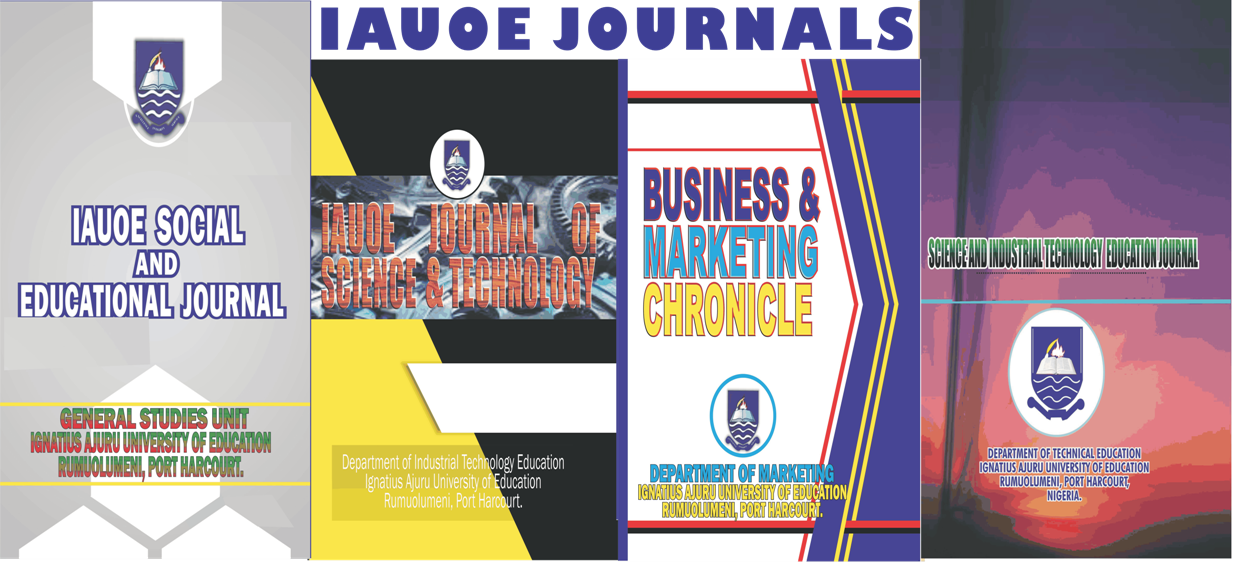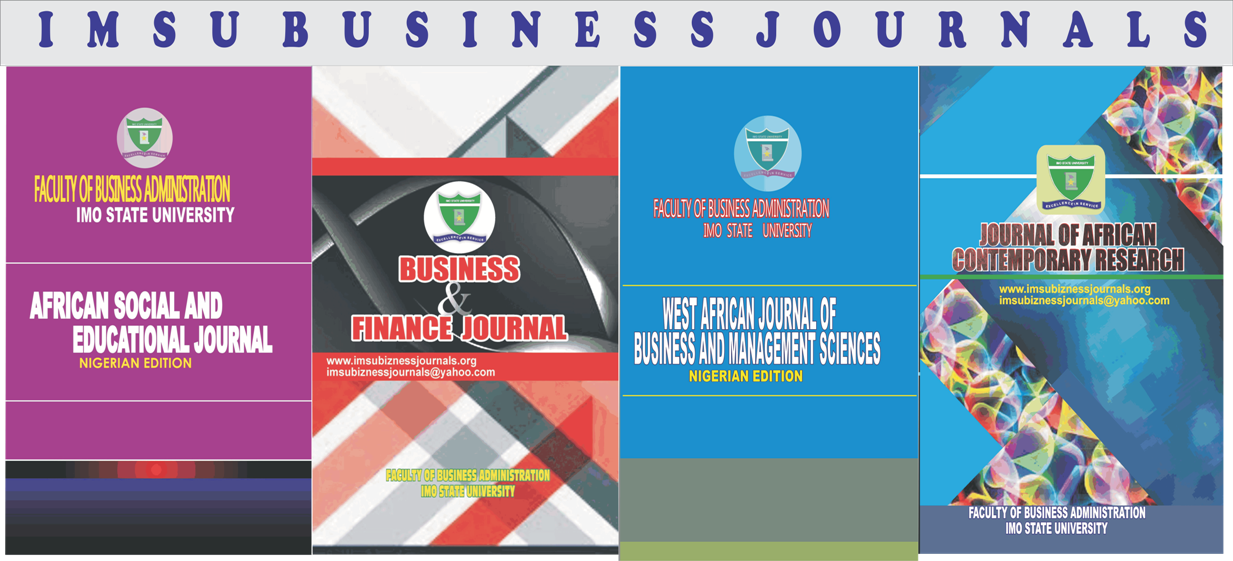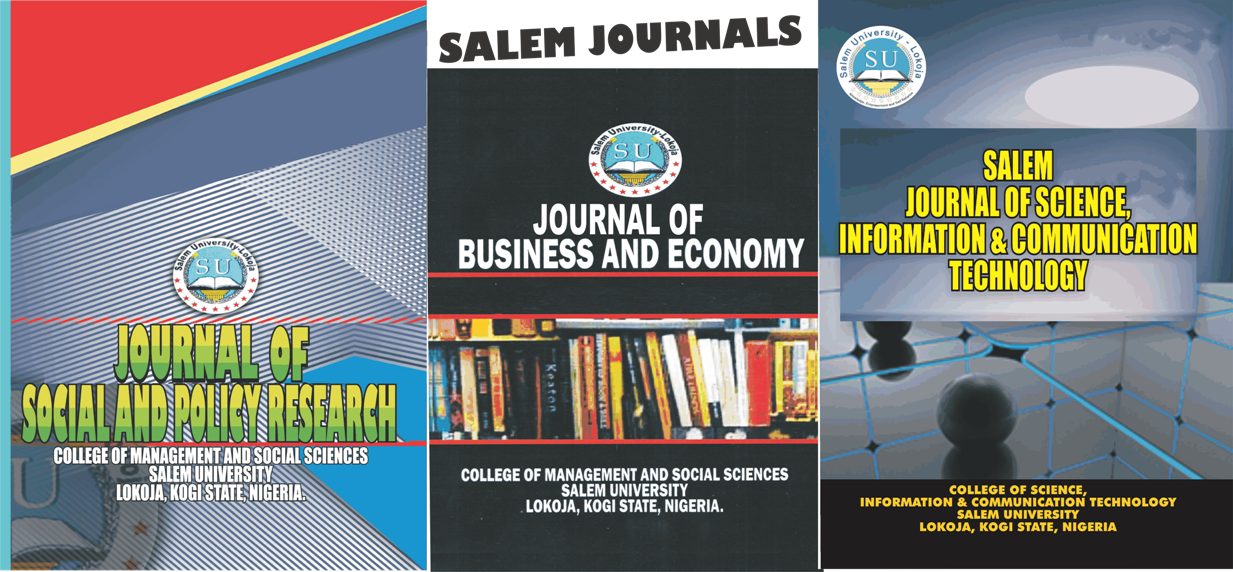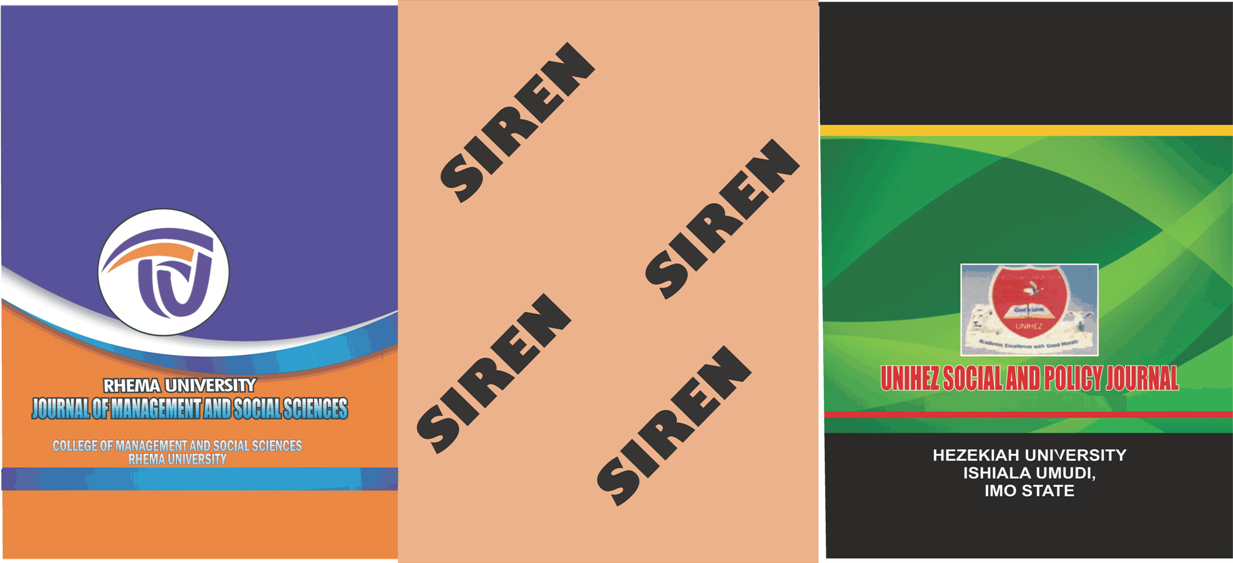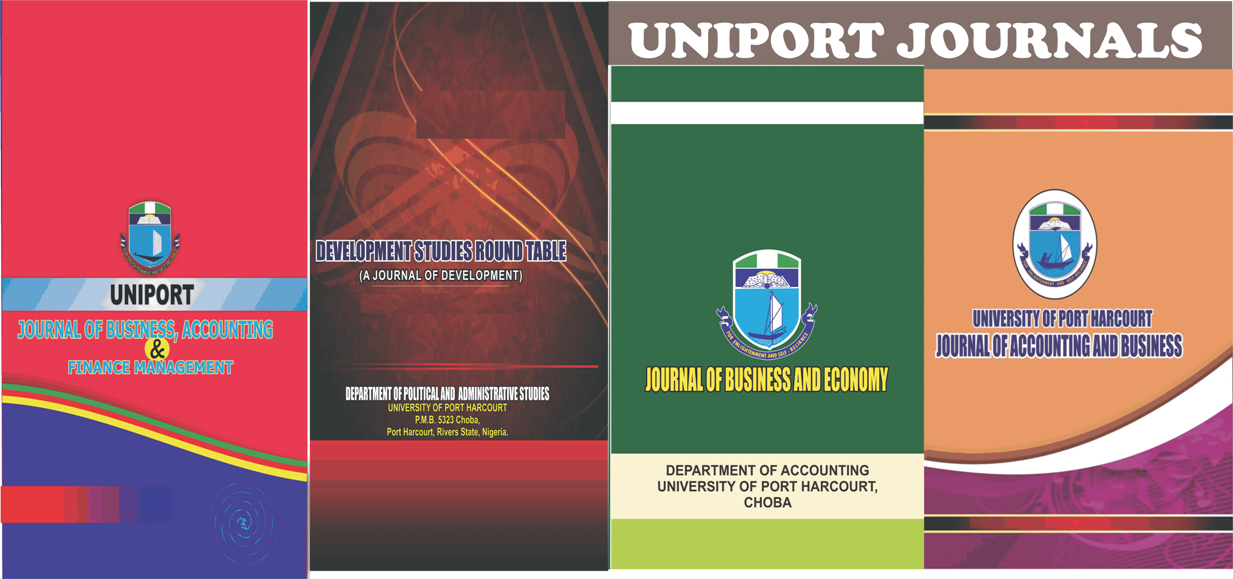2023 Archive
| 1 |
Title: GREEN ACCOUNTING AND FINANCIAL PERFORMANCE OF OIL AND GAS COMPANIES IN ....pdf Author: Prof. J.N Ihe & Nnodim, Eniwogho Ologhene Abstract: This study investigated the effect of green accounting on financial performance of listed oil companies in Nigeria. The study adopted experimental research design using ex-post-facto data which was extracted from NGX Group Factbook and the annual published financial statement of the oil companies in Nigeria. The sample size of the study was eight. The study covered a period of ten (10) years from 2012-2021. Descriptive statistics and unit root test were conducted. The study used Panel data regression for the test of hypothesis with the aid of E-view statistical software version 9. The dependent variable in the study is financial performance measured with return on capital employed, earnings per share (EPS), and net profit margin NPM) while the independent variable is green accounting measured with environmental sustainability costs, waste management costs, and environmental clean-up costs. The findings of the study revealed that the relationship between environmental sustainability costs, environmental clean-up cost, waste management cost and return on capital employed, earnings per share and net profit margin is not significant. The study concluded that green accounting is a determinant of financial performance of the listed oil companies in Nigeria and recommended that quoted oil and gas companies should increase the extent of economic activities on the environment and disclose this in the annual reports for investment decision making and to enjoy long-run corporate sustainability and an improved financial performance. Furthermore, Government and regulators should strictly enforce green accounting disclosure in annual reports by oil companies. View |
| 2 |
Title: ELECTRONIC BANKING AND PERFORMANCE OF MONEY DEPOSIT BANKS IN NIGERIA ....pdf Author: Prof. Ihe Ndubuisi John & Okafor-Kelly Kelechi Abstract: This study examined electronic banking and performance of deposit money banks in Nigeria. The general purpose of the study is to examine electronic banking and performance of deposit money banks in Nigeria from (2012-2021). After exhaustive literature review, secondary data was sourced from CBN statistical bulletin. Electronic banking were proxied with automated teller machine (ATM), Mobile banking (MB) and point of sale (POS) while performance was proxied with return on equity and return on asset. The study employed ordinary least square (OLS) using SPSS statistical package. Findings reveals that there is positive and insignificant effect of automated teller machine (ATM) on return on equity of deposit money banks in Nigeria, there is negative but insignificant impact of mobile banking (MB) on return on equity of deposit money banks in Nigeria, there is negative but significant effect of Point of sales (POS) on return on equity of deposit money banks in Nigeria, there is negative and insignificant effect of automated teller machine (ATM) on return on asset of deposit money banks in Nigeria. There is negative but insignificant impact of mobile banking (MB) on return on asset of deposit money banks in Nigeria. There is negative but significant effect of Point of sales (POS) on return on asset of deposit money banks in Nigeria. We therefore concluded that Electronic banking have a negative and insignificant relationship with performance of deposit money banks in Nigeria. The study therefore recommends that there is need for banks to upgrade their information and communication technology infrastructural facilities. Cost of installing a sound ICT should be minimized or regulated by the government and more so, they (government) should as a matter of urgency fix the issue of power supply. Banks information technology training programme should be encouraged among the staff. Banks should not just invest in more e-channels but rather also see to it that those channels are efficient and effective in relation to services each of them perform. View |
| 3 |
Title: SELF-ASSESSMENT REGIME AND TAX REVENUE IN SOUTH-EAST ZONE OF NIGERIA....pdf Author: Prof. Ihe John Ndubuisi & Orji Magnus Chinasokwu Abstract: This study self-assessment regime and voluntary compliance on tax administration in Nigeria was conducted with the specific objective of finding out the effect of tax knowledge, tax education, tax revenue, loss of revenue, financial constraints, and tax compliance on governance quality in Nigeria. The study employed descriptive and exploratory research design. Data was sourced through the distribution of structured five point Likert scale questionnaire administered to 400 respondents of the conventional Federal Inland Revenue Services(FIRS), within the South East Zone. Out of 400, only 250 were returned. The reliability test was conducted with Cronbach Alpha and Descriptive Statistics of the data variables were also conducted. Normality test, outlier, multi-collinearity test were all conducted. Multiple regression of the ordinary least square regression was carried out with the aid of Solution Package for Social Science (SPSS) version 23. A significant outcome reveal that tax knowledge and loss of revenue had a positive and impactful association with governance quality, while tax education, tax revenue, financial constraints, and tax compliance had insignificant relationship with governance quality. Therefore, the study concluded that the association between self-assessment regime and compliance and tax administration in Nigeria is not significant. Hence, the study recommend that Tax administrators should as a matter of urgency engage on extensive advertisement and one-on-one talk with taxpayers to boost their knowledge on self-assessment and tax compliance and the government should identify areas through which tax revenue is lost and block or possibly make policies and laws that discourage people from evading taxes. The periodic scope ranges from 2011 to 2021, being period of Self-Assessment regime in Nigeria. View |
| 4 |
Title: STAFF CASH DEFALCATION FRAUD AND FINANCIAL PERFORMANCE OF DEPOSIT MONEY ....pdf Author: Prof. Ihe Ndubuisi John, Amaefule, Leonard Ifeanyi Ph.D & Ebere Nelson Chukwudi Ph.D Abstract: The study investigated the effect of staff cash defalcation and financial performance of deposit money banks in Nigeria from 2010 – 2020. Financial performance was proxied with Return on Assets and Return on Equity while independent variable is staff cash defalcation fraud obtained from annual report of Nigeria Deposit Insurance Corporation (NDIC) financial statement. The study used the ordinary least square of e-view 9 for the analysis. Two hypotheses were formulated for the study. The result of the findings shows that insignificant relationship exist between staff cash defalcation fraud and return on asset and return on equity of deposit money banks in Nigeria. The study therefore recommended that good internal organizational control should be put in place by the banks. They should ensure that proper delegation exists, duties of job should be clearly divided and jobs should not overlap. Similarly, staff members should have limited access to sensitive materials like cheques and stamps. Banks should make available individual password that will enable staff to individually sign to their computer page and carry out their designated assignments. View |
| 5 |
Title: INTERNATIONAL FINANCIAL REPORTING STANDARDS AND FINANCIAL PERFORMANCE OF ....pdf Author: Prof. E.C Umeaka; Prof. Ngozi G. Iheduru & Akpeekon, Barisua PhD Abstract: The study examines international financial reporting standards and performance of quoted manufacturing consumers’ goods firms in Nigeria. Data for the study was obtained mainly from secondary sources of the sampled consumers’ goods firms. The data were subjected to statistically analysis using T-test statistical tool. Multiple regression analysis and Pearson Product Moment correlation were used to test the difference in the financial performance between the pre and post IFRS periods of the listed consumers’ goods firms in Nigeria. The study revealed that there is a significant difference between return on assets, return on equity and earning per share of the listed quoted consumers’ goods firm in Nigeria during the pre and post IFRS periods. It was therefore recommended that the post IFRS standards should be retained and regulatory financial agencies, internal and external auditor should ensure strict compliance to IFRS standards in Nigeria. View |
| 6 |
Title: CORPORATE SOCIAL RESPONSIBILITY AND PERFORMANCE OF DEPOSIT MONEY BANKS IN ....pdf Author: Prof E.C Umeaka & Nwosu, Uzochukwu Stanley Abstract: This study examined Corporate Social Responsibility and the Performance of Deposit Money Banks in Nigeria with specific objectives to establish the effect of corporate social responsibility on profit after tax, return on assets and return on equity in a 3 model structure. The Study adopted ex-post facto research design and therefore extracted data from selected banks from 2005 - 2017. The researcher used donations on health, education and environment by the banks as proxies for corporate social responsibility while profit after tax, return on assets and return on equity were engaged as each dependent variable. The study used multiple regression analysis to estimate the relationship of the variables. The findings from data analyzed indicate that donations on health have negative significant effect on profit after tax. It was also found that corporate social responsibility has significant effect on profit after tax, return on assets and return on equity. And therefore recommends that banks should be more environmentally friendly; bank should increase their donations on health, education and should identify activities that would impact more on the society in other to attract continued patronage so as to earn profit. View |
| 7 |
Title: BUDGET DEFICIT FINANCING AND ECONOMIC DEVELOPMENT IN NIGERIA (1999-2019).pdf Author: Amaefule, Leonard & Ifeanyi Kpurugbara Nwinee PhD Abstract: This study examined budget deficit financing and economic development in Nigeria for the period 1999-2019. The study adapted the expo-facto research design and made use of secondary data which were sourced from the Central Bank Nigeria statistical Bulletin. The study disaggregated budget deficit financing in domestic debt and external debt while total capital expenditure (TCE) and Human development index were proxies for economic development. The data were analysed using multiple regression. The results from the analysis revealed that domestic has a statistically significant effect on total capital expenditure and human development index, external debt showed insignificant effect on total capital expenditure and human development index. Also that there is a long run relationship existing among variables. The study concluded that the various means of financing budget deficit such as external and domestic debt should be managed and effectively utilized. Thus recommend that the basic indices of development such are health, education and infrastructure should place above all to fast track economic development. Also, an optimum level of external debt as a mechanism of monitory drive to economic development. View |
| 8 |
Title: ELECTRONIC BANKING AND PERFORMANCE OF DEPOSIT MONEY BANKS IN NIGERIA ....pdf Author: Emenyonu Emmanuel E., Nnodim Eniwogho Ologhene & Onuoha, Chinagorom Juliana Abstract: This study examined electronic banking and performance of deposit money banks in Nigeria (2005-2020). Data were sourced from the Nigerian Exchange Group (NEG) Fact Book and Central Bank of Nigeria Bulletin. Electronic banking was proxied by Automated Teller Machine (ATM), Point of Sales (POS) and Mobile banking while Performance was proxied by Return on Assets (ROA) and Earnings per share (EPS). The study employed Vector Auto Regression (VAR) using E-view 10 statistical package in the analyses. Findings revealed that there is positive and insignificant relationship between ATM and EPS of deposit money banks in Nigeria. There is positive and insignificant relationship between ATM and ROA of deposit money banks in Nigeria. There is negative and insignificant relationship between POS and EPS of deposit money banks in Nigeria. There is positive and insignificant relationship between POS and ROA of deposit money banks in Nigeria. There is negative and insignificant relationship between mobile banking and EPS of deposit money banks in Nigeria. There is negative and insignificant relationship between mobile banking and ROA of deposit money banks in Nigeria. The study concludes that a mixed finding exists between the explanatory variables and the dependent variables. Therefore, it was recommended that banks should encourage their customers to key into mobile banking by helping them to acquire basic skills for mobile banking. Automated teller machines should be located in major places in towns and cities, local government areas and rural areas so as to ease banking transactions, reduce cost and prevent the risk of carrying cash around by customers. View |
